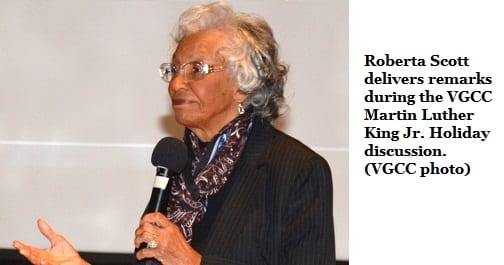— courtesy VGCC
Vance-Granville Community College hosted a program to discuss the life and legacy of Dr. Martin Luther King, Jr., on Jan. 24, after being postponed due to winter weather. The discussion was sponsored by the college’s Minority Male Success Initiative and was held in the Civic Center on VGCC’s Main Campus.
VGCC Counselor Cathy Davis made remarks about the purpose of the event and the King holiday. She quoted the King Center, which said the observance commemorates Dr. King’s actions and words that “answered our collective longing to become a country that truly lived by its noblest principles.” Davis added, “The Minority Male Success Initiative invites you to commemorate this holiday by making your personal commitment to serve humanity, promote Dr. King’s teachings and carry forward his legacy.”
The program then featured VGCC student Angelica Bridges of Oxford presenting a powerful rendition of the song, “Rise Up.”
The featured speaker for the event was Roberta Scott, a longtime public school teacher and retired Adult High School coordinator for VGCC. Scott is currently a member of the Warren County Board of Education, an officer of the N.C. School Boards Association, and an advisor to the North Carolina Department of Public Instruction. In 1963, she participated in the March on Washington, at which Dr. King delivered his famous “I Have a Dream” speech.
First, Scott described growing up in Washington, D.C, in an era when the nation’s capital was racially segregated, recalling the practices that restricted her access to certain restaurants, playgrounds, schools and even seats on trains. She then put the 1963 march in its political and historical context.
“Dr. King met with President John F. Kennedy, and he told the president about the severity of the injustices in the country,” Scott recalled. “Dr. King said we needed a civil rights bill. President Kennedy told him, ‘I understand, but we have so other many things going on’ and said it couldn’t get done right now.”
Scott said that, after that somewhat disappointing conversation with the president, King’s next move was “to organize a nonviolent march in Washington, the march to the Lincoln memorial, which Dr. King felt would be a fitting place.”
She remembered, “There were 250,000 people who marched that August 28 — people marching cheerfully, having conversations, and there was no violence whatsoever. You saw whole families, children marching with their parents. My husband and I were there, and our four-year-old daughter marched right along with us. It was a sight that you will never forget.”
“I don’t think President Kennedy expected Dr. King to really go back and organize such a march,” Scott noted. With many national civil rights groups working together to organize the massive demonstration, the event was effective in galvanizing public support for a federal civil rights bill, which ultimately was signed into law by President Lyndon Johnson after Kennedy’s assassination.
Scott said that young people today typically cannot imagine what the era of segregation was like, because of the work that was done by King and other leaders to make change happen. “You can go anywhere to eat, you can sit where you want to on the bus or the train, go to the college you want to go to, you can do all of these things without even having to think about it,” Scott said. “But there was a day when you couldn’t do that. It’s hard for you to realize.”
She emphasized the importance of rejecting hatred and of voting. “We need to become passionate in a nonviolent way, and we need to encourage everyone 18 years or older to vote,” Scott said. “Do whatever you can in your community to help, to make a difference, and to keep Dr. King’s dream alive, the dream of equality and freedom.”
The program was one of two organized by the VGCC Minority Male Success Initiative in honor of the King holiday. The other was a trip for students to the International Civil Rights Center & Museum in Greensboro.
–VGCC–
